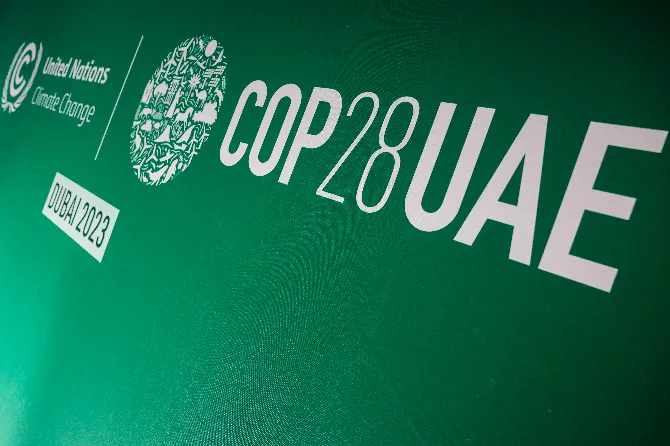-
CENTRES
Progammes & Centres
Location
COP28 must serve as a unifying forum with a targeted Global South focus agenda and should not continue to be hampered by the burdens of the past

In 2023, the average global temperature exceeded pre-industrial levels by at least 1.5 degrees for over one-third of the calendar year—an unprecedented occurrence. The impacts of human-induced climate change are now among the foremost threats to human existence as witnessed by the devastating floods in Asia, Africa, and Europe and extreme heat and cold waves experienced worldwide. A recent analysis by the Intergovernmental Panel on Climate Change (IPCC) suggested the possibility of limiting global warming to the levels agreed to in the Paris Agreement is becoming increasingly bleak. Current policies point to a 2.8-degree temperature rise with updated nationally determined contributions (NDCs) since COP26 only make a negligible difference to predicted 2030 emissions.
COP28 must serve as a forum to identify renewed pathways for cooperation that can put the world back on track to achieve the Paris Targets. As highlighted by the COP28 President, Dr Sultan Al-Jaber, in a recent event hosted by the Observer Research Foundation, Think20 India, Think28, and the Emirates Policy Centre—“Identifying pathways to eliminate 22 gigatons of carbon emissions by 2030 (needed to limit global warming to 1.5 degrees) is the primary target for COP28. We need to stop pointing fingers and focus on fighting the 22 gigatons by garnering and uniting all efforts across different stakeholders.”
For the COP28 to be effective, there is a need to focus on creating a new narrative around climate action- one that places the Global South at the centre. This is essential for two main reasons. First, the Global South is already bearing disproportionate impacts of climate change, exacerbating existing inequalities. Estimates suggest that the gap in economic output between the world’s richest and poorest countries could be as high as 25 percent compared to a world without climate change. Achieving the SDGs now hinges critically on the ability to build resilience to climate change in these economies.
Second, While the developed world has been the major contributor to historical energy-related emissions; future emissions will be concentrated in the developing world. For instance, 90 percent of additional electricity demand by 2040 will come from the developing world. This growth is imperative to eliminate energy poverty and ensure the achievement of the SDGs. Fortunately, much of the energy infrastructure in these countries is yet to be built. Essentially, a successful global energy transition will hinge upon linking the energy transition to the development agenda in these countries by providing the right resources to build low-carbon energy infrastructure that also improves energy access and affordability.
Historically, the United Nations Framework Convention on Climate Change (UNFCCC) negotiations have consistently fallen short in establishing favourable conditions for climate action led by the Global South. Repeatedly, the developed world has refused to commit to binding emission reduction targets, posing a significant obstacle to operationalising the “Common but Differentiated Responsibilities” principle enshrined in the Paris Agreement. Consequently, rather than concentrating on creating an enabling environment for an effective energy transition in the Global South, negotiations have devolved into contentious battles between different groups over what constitutes an equitable distribution of the available carbon space. Moreover, trust between the developed and developing world has been further eroded by the failure to deliver on the promises of climate finance and technology transfer to the Global South. The starkest example is the failure to meet the commitment to provide US$ 100 billion annually to the developing world by 2020.
Thus, COP28 must find a way to reinvigorate multilateral climate cooperation by creating a new narrative that can rebuild trust between the Global North and South. Fortunately, this year’s COP comes at a time when there is growing momentum for climate initiatives led by the Global South in various international forums. Notably, the inclusion of the Green Development Pact in the New Delhi Leader’s Declaration is a crucial stride in weaving a cohesive narrative around climate action as a catalyst for sustainable and inclusive growth in the Global South. The consensus at the G20 on this topic is an excellent starting point for the COP28 and UNFCC to identify and implement specific steps to do away with the biases of the past and ensure equitable and ambitious climate action.
In this context, Think20 India, Observer Research Foundation, and Think28 curated a dialogue titled ‘From G20 to COP28: Energy, Climate, and Growth’ in Abu Dhabi in the lead up to COP28. This event convened more than 100 leaders from 63 countries to collaboratively discern actionable strategies advancing the emphasis on the Global South within the framework of India’s G20 presidency and integrating it into the COP28 agenda. The next section puts forward a call to action that emerged out of this dialogue.
As the global community prepares to convene in Dubai for the 28th Conference of Parties (COP28), serious questions are being asked about the ability of the existing climate governance framework to translate intentions into tangible, impactful actions. However, it is also clear that without renewed multilateral cooperation, effective climate action will be impossible.
The deliberations at the pre-COP dialogue culminated in a set of goals that can sustain global efforts for inclusive climate action. These include—working toward the vision of energy prosperity for all; committing to intertwining climate action with social development and ensuring that the strides in health, education, and gender equality are resilient to climatic shocks; leveraging climate and technology together to realise our environmental aspirations; and the need to reimagine and reconfigure global climate finance.
Goal 1: Build consensus around an equitable energy transition pathway that can ensure energy prosperity for all.
Ø There is a need to accelerate the shift away from fossil fuels in the Global North to free up adequate carbon space for the developing world to achieve its development goals Specifically, all UNFCCC parties must commit to tripling renewable energy capacity by 2030, a goal unanimously endorsed by G20 leaders in the New Delhi Leaders Declaration.
Ø The first Global Stocktake (GST) should be harnessed as an opportunity to pinpoint prevailing gaps in climate action, establishing a crucial connection between the performance of nations and their historical emissions. This will be an important pressure point to compel countries lagging in climate action to escalate their future mitigation efforts. Furthermore, the GST must play a pivotal role in discerning prospective emissions pathways that duly consider the developmental requirements of the Global South.
Ø There is a need to redefine the definition of a just transition and international partnerships to enable such a transition. A new approach is needed, one that extends beyond the coal sector alone to encompass a broader economy-wide strategy that allows the developed world to maximize the economic co-benefits of the energy transition.
Goal 2: Integrate the climate-health-gender nexus into mainstream climate governance
Ø Synergising the SDG agenda and climate action will depend upon building resilience in the Global South to the accelerating impacts of climate change. Central to this agenda will be the need to tackle the climate-health-gender nexus in an integrated manner. The role intersection of climate, health, and gender must be institutionalised. All parties to the UNFCC must commit to endorsing a declaration that establishes the framework and catalyses concerted efforts to address climate and health as interconnected challenges.
Ø Efforts at COP28 should prioritise leveraging the advancements made through the G20 Data Gaps Initiative, specifically in closing information gaps at the nexus of climate, health, and gender domains. This approach aims to enhance policy development, streamline impact assessments within the climate policy review process, and conduct risk assessments for timely interventions
Ø Implement capacity-building initiatives that harness women's traditional knowledge in climate resilience, emphasizing their participation in leadership roles and decision-making processes.
Goal 3: Bridge the climate tech divide between the Global North and the Global South
Ø Adopt a “Climate Tech Partnership for Accessibility” to facilitate the flow of existing sustainable technologies from the Global North to the Global South, with a targeted adoption rate of such technologies in the Global South by 2030.
Ø Design and activate a fair and just financing model within the ‘Innovate for Climate Tech Coalition’ to spur growth and innovation in homegrown climate tech ecosystems in the Global South.
Ø Develop a comprehensive incentive structure that accounts for the positive externalities associated with green technologies to ensure their diffusion among different stakeholders.
Goal 4: Shift the climate finance dialogue from billions to trillions
Ø Build momentum around the need for reforming the Multilateral Development Banks, carrying forward the strong agenda established by the G20. Climate action must now be an explicit mandate for these institutions. The lending patterns of MDBs must also be realigned to focus on de-risking investments into the Global South with a clear focus on bridging the climate finance gap by increasing the flow of private capital into high-potential green sectors.
Ø Pave the way for the adoption of a New Quantified Goal on Climate Finance by 2024. Crucially, the conversation must now move much beyond the initial US$100 billion commitment. Developing countries will require between US$2-3 trillion annually to fulfil their climate goals. The new goal must account for this, necessitating a paradigm shift in the dialogue from dealing in billions to addressing the magnitude of trillions
Ø By 2025, operationalise the funding mechanism of the Loss and Damage Fund, with mandated early contributions from developed countries to support communities most vulnerable to climate change impacts.
The strategies highlighted here are, no doubt, ambitious. But the risks associated with climate change loom large and must be urgently addressed. The Indian G20 Presidency has shown that it is possible to build consensus even in troubled times. It is essential that COP28 serves as a unifying forum and does not continue to be hampered by the burdens of the past. A targeted Global South focus agenda provides a good starting point for building consensus. A strong COP28 outcome is now essential for reinvigorating the global climate governance system.
Promit Mookherjee is an Associate Fellow at the Observer Research Foundation
Debosmita Sarkar is a Junior Fellow with the Centre for New Economic Diplomacy at the Observer Research Foundation
The views expressed above belong to the author(s). ORF research and analyses now available on Telegram! Click here to access our curated content — blogs, longforms and interviews.

Promit Mookherjee was an Associate Fellow at the Centre for Economy and Growth in Delhi. His primary research interests include sustainable mobility, techno-economics of low ...
Read More +
Debosmita Sarkar is an Associate Fellow with the SDGs and Inclusive Growth programme at the Centre for New Economic Diplomacy at Observer Research Foundation, India. Her ...
Read More +